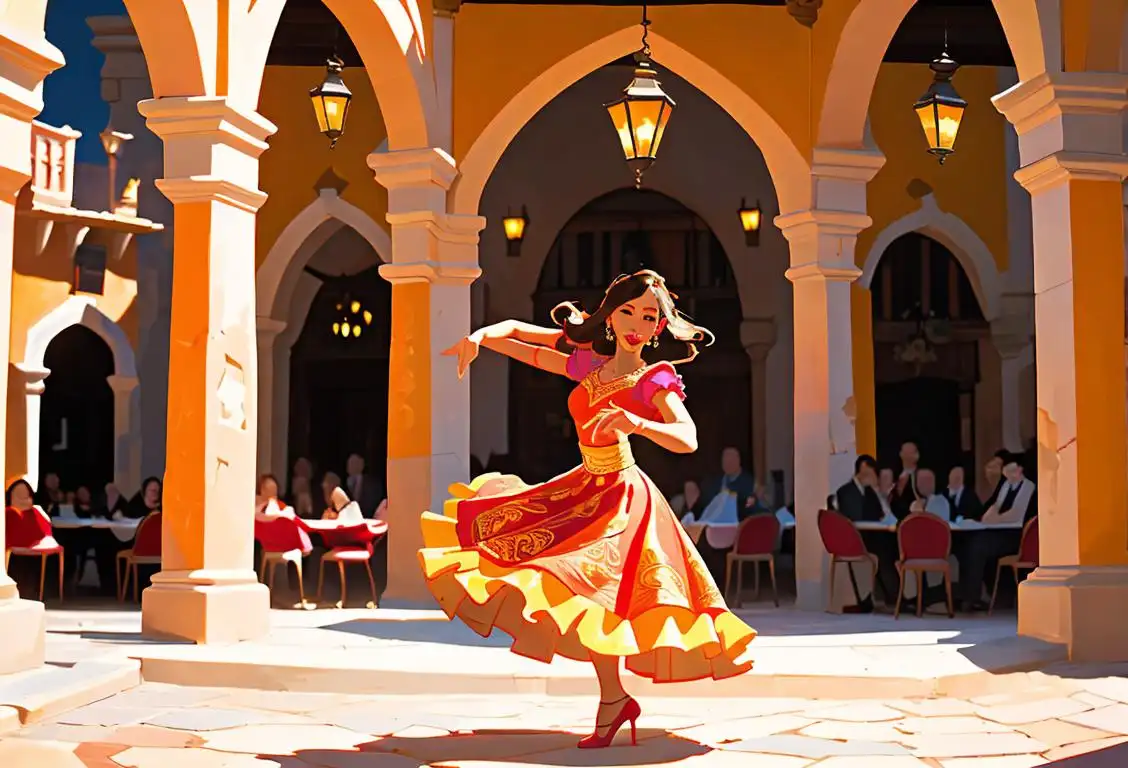National Spain Day

¡Hola amigos! Get ready to flamenco your way into the fascinating world of National Spain Day. This special day is all about embracing the vibrant culture, delicious cuisine, and rich history of Spain. So grab your castanets and let's dive into this Mediterranean marvel!
When is Spain Day?
It's national spain day on the 12th October.
A Blast from the Past
Every year on October 12th, Spain celebrates its National Day, also known as Día de la Hispanidad. This date commemorates Christopher Columbus's arrival in the Americas in 1492, marking the beginning of Spain's historic contributions to exploration and discovery.
A Vibrant Celebration
Spain certainly knows how to throw a party, and National Spain Day is no exception. The streets come alive with parades, concerts, and traditional dances. Flamenco rhythms fill the air, enticing even the most shy wallflower to bust a move. It's a day to celebrate Spanish heritage, togetherness, and the incredible contributions the country has made to the world.
Culinary Delights
When it comes to irresistible cuisine, Spain takes the cake (or rather, the paella). On National Spain Day, food plays a central role in the festivities. Indulge in a feast of tapas, savory paellas, and crispy churros dipped in rich chocolate sauce. Wash it all down with a glass of sangria or a refreshing glass of gazpacho. Your taste buds will thank you!
History behind the term 'Spain'
218 BCE
The Roman Conquest
In 218 BCE, the Roman Republic launched the Second Punic War against Carthage. As part of their military campaigns, the Romans conquered the Iberian Peninsula, which they named Hispania. The Roman presence in the region laid the foundation for the later cultural and linguistic development of Spain.
711 CE
The Muslim Conquest
In 711 CE, Muslim armies from North Africa invaded the Iberian Peninsula. Led by Tariq ibn-Ziyad, they quickly defeated the Visigothic kingdom and established Muslim rule over most of the peninsula. This period, known as Al-Andalus, had a lasting impact on the culture, architecture, and language of the region.
1492
The Discovery of the New World
In 1492, Christopher Columbus, sailing under the Spanish crown, reached the Americas. This voyage marked the beginning of the Spanish colonization of the New World and set Spain on a path of exploration and empire-building. The wealth from the American colonies, especially in gold and silver, fueled Spain's rise as a global superpower.
1588
The Spanish Armada
In 1588, King Philip II of Spain sent a large fleet, known as the Spanish Armada, to invade England and overthrow Queen Elizabeth I. However, the English fleet, led by Sir Francis Drake, successfully repelled the Spanish forces in a famous naval battle known as the Spanish Armada. This defeat marked the decline of Spain's naval supremacy and its decline as a major power.
1939-1975
The Franco Regime
From 1939 to 1975, Spain was under the authoritarian rule of General Francisco Franco. The Franco regime was characterized by censorship, repression, and political isolation. However, it also saw a period of economic growth and stability, known as the Spanish Miracle, which modernized the country's infrastructure.
1978
Transition to Democracy
In 1978, Spain transitioned from a dictatorship to a parliamentary democracy. The new constitution established a constitutional monarchy under King Juan Carlos I and guaranteed civil liberties and political freedoms. Spain has since become a member of the European Union and made significant progress in terms of economic and social development.
Today
Spain's Cultural Richness
Today, Spain is renowned for its rich cultural heritage, including its diverse architecture, art, cuisine, and festivals. It is home to numerous UNESCO World Heritage Sites, such as the Alhambra in Granada and the Sagrada Familia in Barcelona. Spain's contributions to literature, music, and dance have also had a significant impact on global culture.
Future
Continuing Influence
As Spain moves into the future, it continues to play a role in shaping global affairs. Its language, Spanish, is one of the most widely spoken languages in the world, and its influence can be felt in various fields, including literature, film, and business. Spain's unique blend of history, tradition, and modernity ensures its ongoing cultural impact on a global scale.
Did you know?
Did you know that Spain is home to the world's oldest restaurant? Restaurante Sobrino de Botín in Madrid has been serving hungry patrons since 1725! Talk about a long-standing culinary tradition.Tagged
romance food funFirst identified
12th October 2017Most mentioned on
12th October 2020Total mentions
100Other days
One Day
Family Day
Action Day
Kissing Fried Chicken Day
Vodka Boyfriend Day
Awareness Day
Opposite Day
Suicide Prevention Month Day
Happiness Day
Nutty Fudge Day









